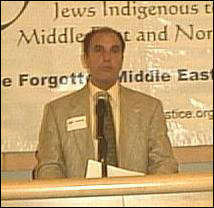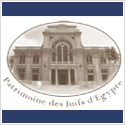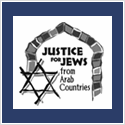Marc Khedr’s Story
Although the truck they were crammed into was covered in dark fabric, the wind would occasionally kick up the flaps over the window, revealing the dusty highway. It was June and it was hot. Marc Khedr had already spent his first night in an Egyptian prison. He and his father had been taken from their Cairo home the night before. Marc’s father thought they were going to a concentration camp as the large trucks rattled hours from the capital.
There were once 80,000 Jews in Egypt . Some estimates have the population as low as 200 today. From 1948 the thriving community was violated and harassed, kidnapped and beaten. The violence reached its worst moments during the 1956 and 1967 wars.
“I lived like a king,” Khedr says. His r’s roll. He is an Egyptian and speaks with an Egyptian accent. The stage was set for the young 18 year old Khedr. Summer was just starting and that meant three months of vacation. While Khedr was young enough to be a student he was not. Instead he taught technical drawing at the Instituto de Umbusco in Cairo and earned 18 pounds a month.
But in the early hours of June 6th 1967, when Israel and Egypt and Israel again went to war, his summer of living like summer of living like a king was swept away.
“The truck stopped and there was wind,” he says. “And you could see big gates. We had to jump, and the old ones were pushed down.” Khedr and his A father had arrived at Abu Zaabal, a prison two hours from Cairo .
There they were herded into a big amber (room). “It was 25 by 30 with big tiles and they had 60 people in there,” he says.
The following morning the prisoners, 400 of which were Jewish, were forced to run in the courtyard, chased by an Egyptian soldier hitting them with a belt.
“He called my name so I went. He asked me if I had a problem with my heart and it was beating very fast. I was scared and I said yes. So he put me in another amber, Amber 24… for the old and sick. My father told them I was sick so they wouldn’t hit me with the belt.”
Amber 24 was the same size as 21. Again sixty people were crammed inside forming three rows of twenty people at night.
“If you had to get up to go to the bathroom at night, you would fall over the other people. And when you came back you could never find your place because someone had moved into it.”
Khedr went to great lengths to sleep on the ungiving tile floor. He initially used the aluminum plate the soldiers had given him on arrival. But later found a more suitable pillow. The bread that the prisoners were given was dirty and Khedr talks of finding sand, cigarette butts and nails within. He gave up the aluminum plate and started using the bread as a pillow.
A few days after his arrival a trainload of 200 Jews from Alexandria came in. They were tired and injured after their long train ride. The Egyptians had written that they were prisoners from shot-down Israeli planes and during the ride they were pummeled with rocks.
He and his father stayed in Abu Zabbel for eight months before being moved to Tora, another prison. Khedr remembers the bad times at Tora but also a man they called the ‘Train’.
“He was very skinny but with many muscles. He was a Muslim and he would run and people would follow. It was three quarters of a mile around the entire court of the prison and he would run till no one could follow. At first I got tired after two or three laps. But after my lungs and my heart became stronger I could run further. And with all the prisoners watching we competed. He ran 25 laps and I knew I had to make one more. And I ran 26.”
Tora was placed directly in the path of Israeli war planes. Khedr thinks that the Egyptians wanted the Israelis to blow it up and kill the prisoners.
“Once I saw an Israeli plane, less than a building in height over us. I saw the Star of David and the pilot knew we were there because he dropped bombs all around and not on us. I saw some black smoke and the Muslims thought the plane was shot down but it flew very high into the air very fast.”
After 3 years and one month Zhedr was released and expelled from Egypt . His mother, sister, brother and father came with him to Paris . There he lived for eight months working in a women’s clothing store.
He talks about the sense of freedom he had in Paris . After his stint in the French capital his family moved to San Francisco , where his older brother had gone before the 67 war and the subsequent roundups.
In san Francisco he worked at another clothing store for ten years. Later he would buy his own Quality Tune Up Shop, part of a nation wide franchise. Along the way he met a fellow Egyptian Jew and with her had three children.
While he has spent more than thirty years in America he is still very Egyptian.
“Maybe if there wasn’t the war we would have stayed in Egypt ,” he says.




